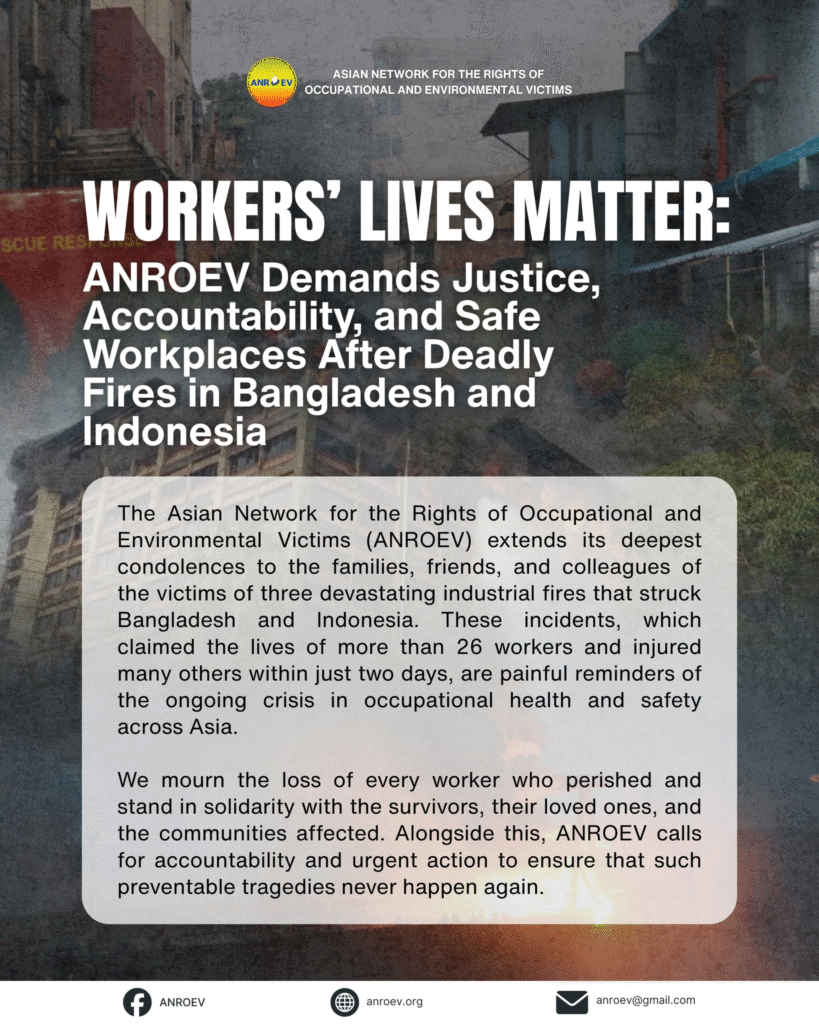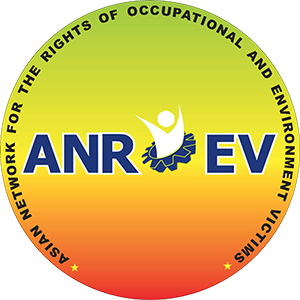Workers’ Lives Matter: ANROEV Demands Justice, Accountability, and Safe Workplaces After Deadly Fires in Bangladesh and Indonesia

The Asian Network for the Rights of Occupational and Environmental Victims (ANROEV) extends its deepest condolences to the families, friends, and colleagues of the victims of three devastating industrial fires that struck Bangladesh and Indonesia. These incidents, which claimed the lives of more than 26 workers and injured many others within just two days, are painful reminders of the ongoing crisis in occupational health and safety across Asia.
We mourn the loss of every worker who perished and stand in solidarity with the survivors, their loved ones, and the communities affected. Alongside this, ANROEV calls for accountability and urgent action to ensure that such preventable tragedies never happen again.
Two of the fires occurred in Bangladesh’s garment sector, once again drawing attention to the persistent and deadly safety issues faced by workers in one of the country’s most important industries.
The first fire occurred on October 14 in Dhaka, when a fire broke out around midday on the third floor of a seven-storey garment factory in the Mirpur area. According to Fire Service Director Tajul Islam Chowdhury, the blaze quickly spread to an adjacent chemical warehouse that stored bleaching powder, plastic, and hydrogen peroxide, materials known to be highly flammable.
Rescue operations have so far recovered 16 bodies from the second and third floors. Officials have warned that the death toll may still rise as search and recovery continue. Many of the victims were burnt beyond recognition, and authorities have confirmed that DNA testing will be conducted to help identify them before their remains are returned to their grieving families.
The cause of the fire remains under investigation. However, early reports suggest that the nearby chemical warehouse may have been operating without a valid license, raising serious questions about the enforcement of safety regulations and industrial oversight.
Barely a day after this devastating incident, another fire broke out at Adam Cap, a towel manufacturing unit located in the Chittagong Export Processing Zone (CEPZ). According to the Assistant Director, Md. Anwar Hossain of the Agrabad Fire Service, the cause of the fire has yet to be determined. Fortunately, no casualties have been reported, though authorities are still evaluating the extent of the damage to the facility and surrounding units.
On October 15, the same day that Bangladesh was still reeling from consecutive factory fires, another tragic incident unfolded in Indonesia. A fire engulfed the oil tanker MT Federal II while it was being repaired at a shipyard in Batam, Riau Islands province, claiming the lives of more than 10 workers and injuring 18 others who were carrying out repair work on the vessel. Although the ship was not carrying oil at the time, the cause of the fire remains under investigation.
Alarmingly, this was not the first such tragedy in Batam. A similar shipyard fire in June, killed four workers and injured nine others. In that earlier case, authorities identified individuals suspected of violating standard safety procedures, underscoring recurring lapses in industrial safety and the continued neglect of workers’ welfare.
While these workplace fires occurred in different countries, their close succession reveals a shared and distressing truth: workers across Asia continue to face life-threatening conditions due to poor occupational safety standards, inadequate enforcement of regulations, and a lack of corporate accountability.
In Bangladesh, the garment industry, employing around four million workers and contributing more than 10% of the country’s GDP, remains plagued by unsafe and exploitative conditions. Unsafe handling of combustible materials, poor ventilation, and insufficient emergency preparedness combine to make factory fires a recurring tragedy. The memory of the 2013 Rana Plaza collapse, which killed over 1,100 workers, continues to serve as a stark reminder of what happens when workers’ safety is neglected in the name of production and profit.
Similarly, in Indonesia and other parts of Asia, workers in high-risk sectors such as shipbuilding, chemical processing, and manufacturing continue to face unsafe work environments that lack proper safety measures and emergency preparedness.
These recent fires are not isolated incidents, but symptoms of a systemic failure. A failure to prioritize the lives, rights, and dignity of workers. Each tragedy exposes the urgent need for stronger occupational safety frameworks, genuine implementation of labor laws, and accountability from both employers and state institutions.
ANROEV calls on governments and industries to take decisive action to uphold and protect workers’ right to safe and healthy workplaces. We stand with all workers across Asia in demanding justice, accountability, and safe workplaces for all.
